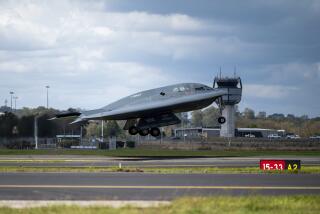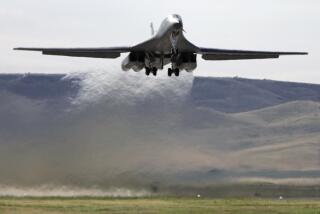B-2 Is Key to U.S. Defense Strategy, Congress Told
- Share via
WASHINGTON — The Air Force, hoping to stem congressional opposition to the B-2 bomber, said Tuesday that the radar-eluding aircraft outpaces 20 years of improvements in the Soviet air defense and is key to the U.S. strategic force.
“The estimate is the Soviets have invested the equivalent of over $350 billion in those defenses over the 20-year period . . . and that investment continues,” the Air Force said in an 18-page report released by the ranking members of the Senate Armed Services Committee.
“That very expensive array of defenses is largely ineffective against an aircraft with B-2 capabilities,” the report said.
In a closed session, Air Force Secretary Donald Rice and Air Force Chief of Staff Larry Welch briefed members of the Senate Armed Services Committee on the B-2, detailing the aircraft’s importance to the strategic forces, its conventional capability and its role if a strategic arms reduction treaty is reached with the Soviet Union.
Sens. Sam Nunn (D-Ga.), chairman of the panel, and John Warner of Virginia, its ranking Republican, released the report.
“We asked the Air Force to address the key issues of cost, flight testing and the comparable worth of the B-2 as the Congress debates the defense program,” Nunn and Warner said in a one-page statement accompanying the report.
Opposition in Congress is based on the bomber’s price tag, estimated at between $500 million and $750 million per plane, and the delay in its first flight.
The bomber, built by Northrop Corp., moved under its own power for the first time Monday when it taxied along an airfield runway at Palmdale. It is scheduled to make its maiden flight sometime in the next two weeks, 18 months behind schedule.
“I have serious concerns about the aircraft,” said Senate Armed Services member John McCain (R-Ariz.), who attended the Air Force briefing. The service “must prove this aircraft before full-scale production.”
Another member of the Senate panel, Democrat John Glenn of Ohio, last month urged Defense Secretary Dick Cheney to push back procurement of the aircraft, questioning the wisdom of “buy before you fly.”
More to Read
Sign up for Essential California
The most important California stories and recommendations in your inbox every morning.
You may occasionally receive promotional content from the Los Angeles Times.













